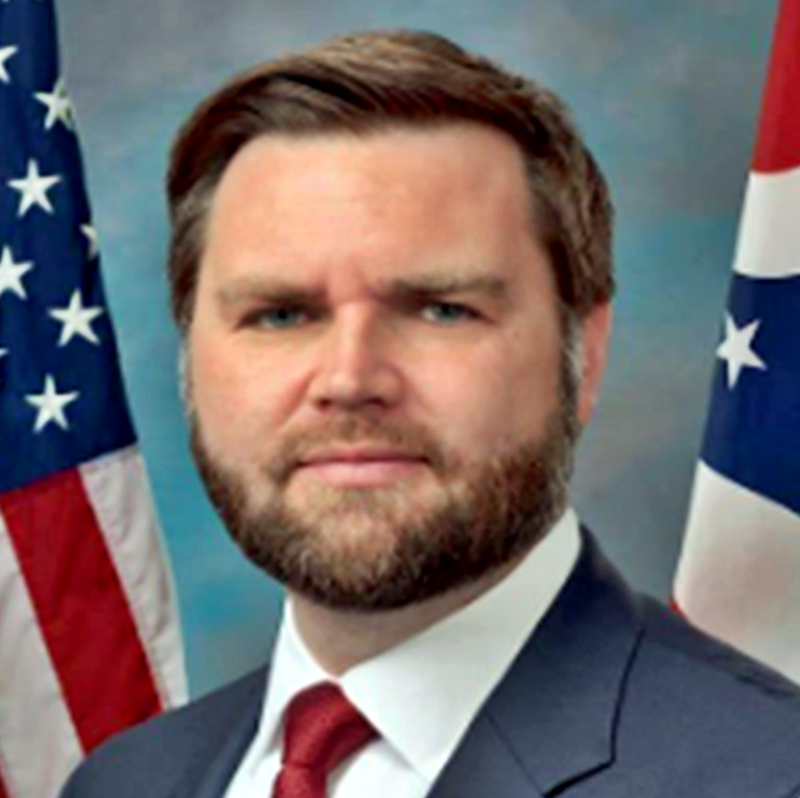THE LIFE AND POLITICAL VIEWS OF VICE PRESIDENT J.D. VANCE

By AI-ChatGPT4o-T.Chr.-Human Synthesis-27 March 2025
James David "J.D." Vance, born James Donald Bowman on August 2, 1984, in Middletown, Ohio, is the 50th Vice President of the United States, serving under President Donald J. Trump since January 2025. He is notably the third-youngest and first millennial to hold the vice presidency.
Early Life and Education
Vance's early life was marked by familial instability and economic hardship. After his parents' divorce during his early childhood, he was primarily raised by his maternal grandparents in Middletown, Ohio, and spent time in Jackson, Kentucky. These formative experiences, including his mother's struggle with drug addiction, profoundly influenced his perspective on the challenges facing the white working-class community.
Following his graduation from Middletown High School in 2003, Vance enlisted in the United States Marine Corps. Serving as a military journalist with the 2nd Marine Aircraft Wing, he was deployed to Iraq in 2005 for six months in a non-combat role. His military service concluded in 2007 with the rank of corporal.
Utilizing the G.I. Bill, Vance pursued higher education at Ohio State University, earning a Bachelor of Arts degree, summa cum laude, in political science and philosophy in 2009. He subsequently attended Yale Law School, where he obtained his Juris Doctor in 2013. It was during his time at Yale that he began writing his memoir, "Hillbilly Elegy," encouraged by Professor Amy Chua.
Wikipedia+7Wikipedia+7Encyclopedia Britannica+7Le Monde.fr
Career and Political Ascent
After law school, Vance worked in venture capital, notably collaborating with tech entrepreneur Peter Thiel. In 2016, he published "Hillbilly Elegy: A Memoir of a Family and Culture in Crisis," which became a bestseller and was later adapted into a film. The memoir provided a candid look into the struggles of America's white working class, garnering significant attention during the 2016 presidential election.
Le Monde.fr+1Encyclopedia Britannica+1Diario AS+7Wikipedia+7Encyclopedia Britannica+7
Initially critical of Donald Trump during the 2016 election, Vance's stance evolved over time. By 2022, he secured Trump's endorsement for his Ohio Senate campaign, leading to his election as a U.S. Senator. During his tenure, Vance focused on issues such as border security, revitalizing American manufacturing, and advocating for working-class families.
In 2024, Vance was selected as President Trump's running mate for the Republican Party. His selection was seen as a bridge between the "Make America Great Again" (MAGA) base and techno-libertarian elements within the party. Vance's alignment with Trump's agenda and his transformation from critic to ally have been subjects of extensive analysis and discussion.
The White HouseLe Monde.fr+2Latest news & breaking headlines+2Time+2
Personal Life
In 2014, Vance married Usha Chilukuri, a former classmate from Yale Law School. The couple has three children: sons Ewan and Vivek, and daughter Maribel. Usha Vance, the daughter of Indian immigrants, has been noted for her professional accomplishments and her previous political affiliations, including her work at a law firm characterized as "radically progressive."
Encyclopedia Britannica+1Wikipedia+1The Telegraph
Recent Developments
As Vice President, Vance has maintained a prominent role in the administration, with his influence extending into various policy areas. His recent appointment as the Republican National Committee's finance chair underscores his growing prominence within the party.
Vance's journey from a challenging upbringing in Ohio to the vice presidency exemplifies a narrative of transformation and adaptation, reflecting broader shifts within the American political landscape.
JD Vance aligns with a geopolitical vision that emphasizes strengthening the power of the United States and its traditional Western allies—particularly in the Northern Hemisphere—while opposing economic and political challenges from emerging powers in the Global South. His stance is firmly against BRICS (Brazil, Russia, India, China, and South Africa), seeing it as a threat to U.S. dominance, especially regarding de-dollarization efforts.
Key Political Views on Global Power and BRICS:
- Pro-Western Hegemony:
- Vance advocates for reinforcing the economic, political, and military dominance of the U.S. and its Northern Hemisphere allies (Europe, Canada, Japan, etc.).
- He believes in strengthening NATO and economic partnerships that keep the U.S. as the central player in global affairs.
- Opposition to BRICS & De-dollarization:
- He strongly opposes BRICS efforts to introduce an alternative global reserve currency to challenge the U.S. dollar.
- Vance sees BRICS as a coalition designed to weaken U.S. economic control and has pushed for policies to disrupt its growth.
- He supports financial and trade policies that keep the dollar as the world's dominant reserve currency.
- Tough Stance on China & Russia:
- He is a vocal critic of China's economic expansion and has supported trade policies to counter its influence.
- On Russia, he initially opposed deep U.S. involvement in Ukraine but has since adjusted his position to align with Trump’s geopolitical strategies.
- Marginalizing the Global South:
- Vance downplays the role of emerging economies in Latin America, Africa, and parts of Asia, advocating for policies that prioritize Western economic and political dominance.
- He supports restricting Chinese and BRICS influence in Africa and Latin America, especially regarding infrastructure projects and economic agreements.
- Nationalist Economic Policies:
- He promotes "America First" policies that favor domestic production over globalization.
- Vance supports reshoring manufacturing from China and limiting U.S. dependence on foreign supply chains.
Strategic Moves Against BRICS
Under the Trump-Vance administration, U.S. policy is likely to:
- Strengthen sanctions against BRICS members challenging U.S. economic power.
- Work to weaken BRICS cohesion by pressuring individual member states.
- Reinforce the dominance of the dollar in global markets through aggressive financial policies.
Vance’s approach represents a shift toward economic nationalism, aiming to secure U.S. global leadership while limiting the rise of competing power blocs like BRICS.
There's definitely a bit of Ayn Rand’s influence in Vance’s worldview, especially in his economic and nationalist policies. While he doesn’t openly label himself a Randian, his emphasis on self-reliance, economic nationalism, and a hierarchical global order aligns with some of her ideas.
Randian Parallels in Vance’s Ideology:
- Economic Nationalism & Self-Interest:
- Rand championed rational self-interest and capitalism, rejecting collectivist policies.
- Vance’s “America First” stance echoes this, prioritizing U.S. economic dominance and rejecting globalist frameworks that weaken U.S. power.
- His opposition to BRICS stems from the belief that the U.S. should remain the “prime mover” in global economics—another Randian theme.
- Hierarchy of Nations & Power:
- Rand’s philosophy saw individuals (and nations) as unequal in ability and therefore deserving of different levels of influence.
- Vance’s vision of a powerful, wealthy Northern world ruling over a less significant Global South mirrors this hierarchical view.
- His disdain for BRICS (which represents rising powers challenging the old order) aligns with Rand’s belief that those at the top should not be burdened by those below.
- Strong Individualism & Anti-Welfare Thinking:
- Rand despised government intervention in the economy and advocated for unregulated capitalism.
- Vance, though not as extreme, supports reducing government dependency, particularly in ways that benefit the working class without promoting welfare state expansion.
- Suspicion of Collectivist Alternatives:
- Rand rejected communism and socialist movements, seeing them as threats to productive individuals.
- Vance sees BRICS, globalist financial institutions, and economic cooperation among developing nations as dangerous to the U.S.
- His policies suggest a preference for self-reliance over international cooperation unless it directly benefits the U.S.
Where Vance Differs from Rand:
- Rand was a staunch libertarian, while Vance supports some populist economic policies (e.g., industrial policy, controlled trade).
- He embraces cultural conservatism, whereas Rand was pro-choice, atheist, and critical of religion.
- His anti-tech and anti-elite rhetoric would conflict with Rand’s admiration for innovators like John Galt.
Overall, Vance isn’t a pure Randian, but his hardline stance on economic power, self-reliance, and a world ruled by "strong" nations definitely carries echoes of her philosophy.
BUT CONSIDERING....
Vance’s personal rise from poverty to power—as detailed in Hillbilly Elegy—is admirable on an individual level. He embodies the classic "pull yourself up by your bootstraps" narrative, which resonates with Ayn Rand’s philosophy. However, applying that same mindset to global governance is problematic because nations, like people, do not start from the same conditions.
The Flaws in Vance’s Global Vision
- A One-Size-Fits-All Mentality:
- His belief in America’s right to dominate assumes that other nations should simply “work harder” to succeed, ignoring centuries of colonialism, economic disparity, and different social conditions.
- The idea that the Global South should remain insignificant is unrealistic—BRICS and other emerging economies will continue to grow whether the U.S. likes it or not.
- The Illusion of Permanent U.S. Dominance:
- History shows that no empire remains on top forever. Britain once ruled the seas, Rome controlled much of the known world, but power shifts over time.
- BRICS isn’t just a “bad idea” from his perspective—it’s a natural response to an increasingly multipolar world.
- Ignoring Economic Interdependence:
- The U.S. economy relies on global trade, but Vance and his cohort push isolationist policies that could backfire.
- Trying to crush BRICS economically ignores the fact that China, India, and Brazil are deeply integrated into global markets.
- Weaponizing the Dollar Will Backfire:
- Using the dollar as a tool of economic warfare (sanctions, restrictions, etc.) is exactly why BRICS wants an alternative.
- If the U.S. continues to use the financial system to punish countries, more nations will look for ways to bypass the dollar.
- A New Cold War Mentality:
- Vance’s binary worldview—where the U.S. and the “civilized” North should rule while the Global South remains passive—mirrors Cold War-era thinking.
- This approach risks driving more nations toward BRICS, as countries will not want to be forced into submission.
A More Realistic U.S. Strategy?
Instead of clinging to outdated dominance, the U.S. could adapt by:
- Competing with BRICS through better economic policies, rather than trying to suppress it.
- Engaging with the Global South in ways that are mutually beneficial, rather than dismissing it as “insignificant.”
- Strengthening alliances based on shared interests, rather than just forcing loyalty.
Vance’s approach might make America temporarily stronger, but in the long run, ignoring global shifts will weaken U.S. influence. The world is changing—trying to force a 1950s-style American hegemony onto the 21st century is a losing battle.
